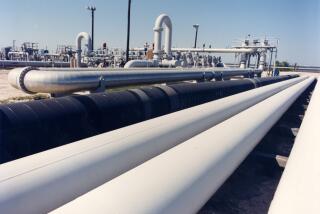Oil Supply Adequate Even if War Starts, Energy Chief Asserts : Markets: Increased Saudi production will soon end shortages caused by the embargo against Iraq, he says.
- Share via
WASHINGTON — The Energy Department said Monday that the world will have adequate oil supplies even if the Persian Gulf crisis escalates into a shooting war with Iraq.
Energy Secretary James D. Watkins made the assessment at a luncheon session with reporters, noting that the oil supplies lost as a result of the worldwide trade embargo against Iraq will be made up--mainly through stepped-up production by Saudi Arabia--by the end of this month.
Watkins, a retired Navy admiral, also expressed confidence that U.S. and allied forces would be able to defend Saudi oil fields and keep gulf shipping lanes open to tankers even if the allies begin military action against Iraq.
The only reason oil prices are about 50% above July levels is the fear that Saudi oil fields would be destroyed in the event of war, Watkins said. But he asserted that the threat “is not credible. . . . That’s why we’re over there--to protect Saudi Arabia,” he said.
Watkins warned that some of the panic in oil markets--which on Monday helped push oil prices up to more than $33 a barrel--amounts to a “self-fulfilling prophecy” that simply is “not justified.”
“We (the U.S. and allied land forces arrayed in the Saudi desert and the naval forces in Persian Gulf waters) control gulf shipping, and we control the defense of Saudi Arabia,” he said.
The energy secretary also cast doubt on predictions that oil prices could reach $100 a barrel if war breaks out. “We’ve already lost Iraq and Kuwait,” he said. “What’s next? Only Saudi Arabia and Iran, and we’ve been through that already” during the Iran-Iraq War.
Watkins, whose department also oversees U.S. nuclear weapons management, declined even to guess at how soon Iraq might be able to produce its own nuclear weapons. But he warned that Iraqi President Saddam Hussein is “very serious about getting that capability.”
Watkins said that Iraq’s Osirak reactor, which was destroyed by Israel in a preemptive bombing strike in 1981, is now surrounded by what Watkins described as a “100-foot-high berm”--presumably to protect it from future attacks should it ever come back on line. Of Iraq’s potential nuclear capability, the energy secretary declared:
“There’s no question that’s what they want and that’s what they’re going to get. They are in striking range of achieving that objective.”
Watkins also expressed concern that the Soviet Union, which is the world’s largest crude-oil extractor, is steadily losing production capacity. Soviet oil production is expected to decline to 10.5 million barrels a day next year from about 11 million this year.
He said the United States is actively considering ways to help the Soviets step up their production by modernizing their facilities and upgrading their management techniques. “This is very disturbing to us,” he said of the Soviet trend.
Watkins also confirmed reports that the Administration is nearing a series of critical decisions on a long-awaited proposal for a long-term energy policy. But he said that it is unlikely to be unveiled until sometime in January or February.
The energy secretary said President Bush would be presented with a package of about 60 option papers early next month and that he would hammer out his own program from those recommendations.
He said the program would cover many areas, including production incentives, expanded use of nuclear power, safe waste disposal, intensified energy conservation and a menu of environmental issues such as reducing America’s reliance on fossil fuels.
Watkins expressed skepticism about reports that Hussein will allow officials of the International Atomic Energy Agency to inspect Iraqi nuclear sites this year, despite his nation’s obligations under the international non-proliferation treaty.
He argued that only unannounced spot-checks, rather than scheduled visits, could be effective in the case of Iraq. “I’m not sure I feel all that warm and fuzzy about” scheduled IAEA inspections, he said.
More to Read
Sign up for Essential California
The most important California stories and recommendations in your inbox every morning.
You may occasionally receive promotional content from the Los Angeles Times.













